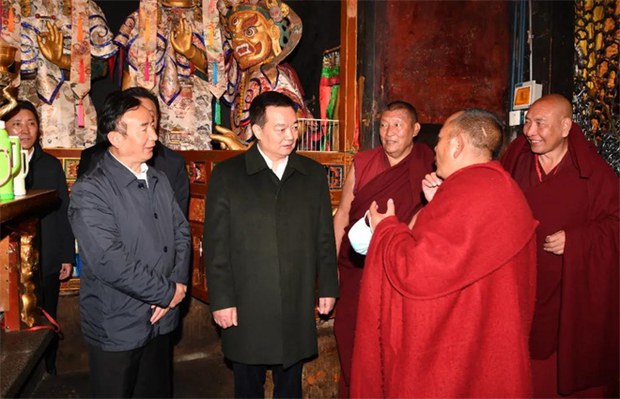A top Chinese official in Tibet visited monasteries in and near the Tibetan capital Lhasa this week to warn monks against behavior considered disloyal to the ruling Chinese Communist Party, state media sources said.
Wang Junzheng, party secretary in the Tibet Autonomous Region, went on Thursday to the Ramoche temple in Lhasa and to Gaden monastery outside the capital, reminding monks to be “patriotic and law-abiding” citizens and remain loyal to the party, according to media accounts.
Wang also instructed monastery management committees in both places to enforce rules against assertions of Tibetan cultural and national identity deemed “separatist” by Chinese authorities.
China regularly tightens security in Tibet’s regional capital Lhasa and in other Tibetan areas of China during important political events in Beijing and in March, a month of politically sensitive anniversaries.
On March 10, 1959, Tibetans in Lhasa rose up in protest of Beijing’s tightening political and military control of the formerly independent Tibet, sparking a rebellion in which thousands were killed.
And on March 14, 2008, a riot in Lhasa followed the suppression by Chinese police of four days of peaceful Tibetan protests and led to the destruction of Han Chinese shops in the city and deadly attacks on Han Chinese residents.
The riot sparked a wave of mostly peaceful demonstrations against Chinese rule that spread into Tibetan-populated regions of western Chinese provinces, and hundreds of Tibetans were detained, beaten or shot as Chinese security forces quelled the protests.
China’s approach to control and surveillance over Tibetan monks and nuns has intensified in recent years, said Pema Gyal, a researcher at London-based Tibet Watch.
“And with the March 10 Uprising Day commemoration approaching soon, the Chinese government is even more vigilant in watching over Tibetan monasteries to avoid any kind of unrest.
“The establishment of management committees in these monasteries is aimed at closely monitoring the monks, and we have also seen political reeducation campaigns recently stepped up in the monasteries,” Gyal said.
“This is the Chinese Communist Party’s strategy for consolidating their power and ‘Sinicizing’ Tibetan Buddhism.”
Wang Junzheng’s recent visit to Tibetan monasteries signals further restrictions ahead of the March 10 anniversary, agreed Tenzin Tsetan, a researcher at the Dharamsala, India-based Tibet Policy Institute.
“It is also meant to help construct a politically stable atmosphere in the region as China’s 20th Party Congress kicks off in the second half of 2022,” Tsetan said.
Tibet was invaded and incorporated into China by force 70 years ago, and Tibetans living in Tibet frequently complain of discrimination and human rights abuses by Chinese authorities and policies they say are aimed at eradicating their national and cultural identity.
Copyright © 1998-2020, RFA. Used with the permission of Radio Free Asia, 2025 M St. NW, Suite 300, Washington DC 20036.







